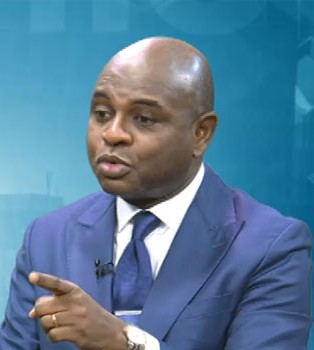Former deputy governor of the Central Bank of Nigeria (CBN) Prof. Kingsley Moghalu, has urged the Nigerian government to focus on dealing with real issues affecting production in the country to achieve stability of the naira.
Moghalu stated this while reacting to the recent depreciation of the naira in both official and parallel segments of the foreign exchange (forex) market.
Join our WhatsApp ChannelThe currency devaluation that came as a result of the forex reforms of the present administration last year, saw the Naira value drop to an all-time low of about N1,900 but achieved some level of appreciation between March and April, rising to about N1,100 per United States Dollar. It, however, dropped again last week with the exchange rate now around N1,400. According to NAFEM data published on the FMDQ platform, the naira to dollar exchange rate at the official market closed at N1,419.11/$1 on Monday which is a 5.96 per cent drop from the N1,339.23/$1 on Friday.
In a post on his X handle, on Monday, Moghalu advised that every effort to achieve stability of the naira without addressing the economic fundamentals is merely chasing the shadow as it is not sustainable.
READ ALSO: Naira Depreciates Further To N1,419/$1 As EFCC Arrest BDC Operators
He said the focus should be on stabilising the naira based on its true value in the forex market.
“The Naira tanking back down to the 1,400s to $1 demonstrates what some of us have been saying. Seeking a falsely ‘strong’ currency when the fundamentals are out of whack is shadow chasing. The focus should be on the STABILITY of the exchange rate, not a populist exchange rate and premature declarations of ‘best-performing currency,” Moghalu stated.
He also expressed concerns about reports of multiple exchange rates to BDCs, Customs, and NAFEX, noting that it is not a good sign in the quest to achieve stability of the local currency.
On the real issues inhibiting the country from creating a productive economy, the former CBN deputy governor stressed the need to increase power supply to about 25,000 Megawatts (MW) to guarantee 24-hour electricity in major industrial cities like Lagos, Kano, Onitsha, and Nnewi among others, in the next two or three years; He equally reiterated the need for dealing with oil theft to increase oil production.
He also called on the Federal Government to privatise the Nigeria National Petroleum Company Limited (NNPCL) for efficiency.
“Let us stabilize the Naira at whatever is its true market value and then pivot to the real issues: taking Nigeria to 20-25K megawatts of 24-hour electricity in 2-3 years starting with Lagos, Kano, Onitsha, and Nnewi (Aba seems promising with Geometric power) so we can create a truly productive economy. Dealing decisively with oil theft and ramping up oil production to bring in $ soonest. Privatize @nnpclimited and raise at $20-$30 billion from an IPO. Or go for a “whale” of a $20-30 billion bailout from @IMFNews (nothing less), with forensic oversight of the money and how it is spent.”
Moghalu pointed out that borrowing from international financial institutions like the International Monetary Fund (IMF) won’t help in addressing the macroeconomic challenges in the country.
“All these “trickle down” borrowing of $1 billion, $2 billion there won’t hack it. We need to get serious. Managing an economy is not politics or a clap-and-dance performance theatre. It’s serious business.”
He added that it is not yet certain that Nigeria’s economic reforms, would attract “serious portfolio inflows” into the economy.
Victor Ezeja is a passionate journalist with six years of experience writing on economy, politics and energy. He holds a Masters degree in Mass Communication.
















Follow Us